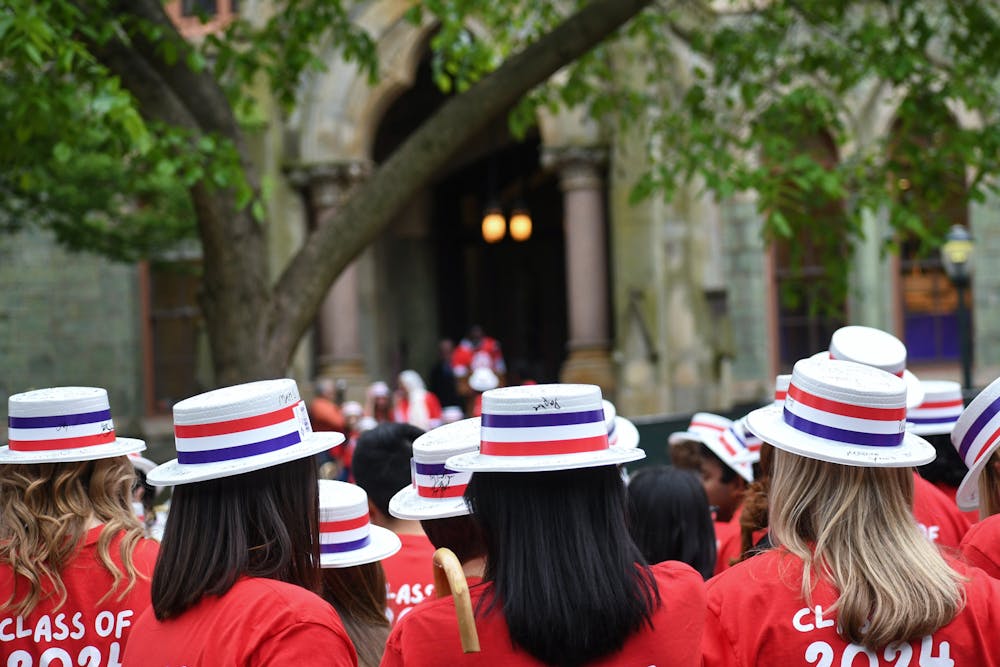
Earlier this summer, I spent three weeks in small-town New Jersey at our football rival’s campus. My older sister had just finished her four years and was graduating from Princeton University.
As much as I scorned Princeton's hideous school colors and elitist attitudes, I couldn’t help but admire one thing. Everywhere I looked, it seemed like there was a fresh tradition to be found.
To name a few, prior to commencement, alumni and graduating seniors take part in a procession through campus as part of their annual P-rade. All four years, students refrain from walking through the iconic FitzRandolph gate, out of fear that they will not graduate in time. Following victory football games against Harvard and Yale, a bonfire celebration is held to commemorate the win.
Upon my return to Philadelphia, I found myself reflecting on our own University and the traditions that accompany it. And in all honesty, I drew a blank.
Sure, there are a few things that come to mind. Toast-throwing, for instance, is one of the most iconic traditions that involves students tossing pieces of toast onto Franklin Field during home football games. Hey Day marks the transition from junior to senior year when students dress in hats and canes to march down Locust Walk to College Hall. During Spring Fling, the Social Planning and Events Committee brings in a headlining musician to perform on campus.
But these traditions, too, have faced their own bouts of controversy and even lost some of the detail that once defined them. Specifically, Penn students have questioned whether the food waste that comes as a result of toast-throwing is appropriate amidst high levels of food insecurity in Philadelphia. The small turnout at most Penn football games also diminishes the number of students who actually partake in this tradition. The iconic styrofoam hats from traditional Hey Days have been replaced by hats made from environmentally sustainable plastic that are no longer biteable as a result. Spring Fling and its headliners have an unfortunate past, filled with riot-like situations, controversial musicians, and yearly mass disappointment from students.
Many of Penn’s traditions were established decades ago when the University was vastly different than it is now. Today, they have the capacity to reflect the diversity of its student body, changing global concerns, and the fundamental values that define our school. More than anything, they can serve as an enjoyable way to bring together members of the Penn community.
It is in Penn’s best interest as well to develop strong University-wide traditions. A relationship has been identified between university rituals and alumni’s dedication to their higher education institutions. Specifically, alumni who feel that their alma mater values well-established traditions exhibit stronger loyalty to their university, rather than those who feel otherwise.
This has a direct effect on the likelihood that graduates will remain connected to Penn. After all, part of the pull of strong traditions is the idea that recent alumni can bond over the same events that decades-old alumni also experienced. It is a shared experience that transcends time. The University does recognize this fact, which is likely why Penn Traditions, an organization dedicated to preserving and celebrating Penn’s history, is located in the Sweeten Alumni House.
Penn Traditions works with organizations like University Life and student class boards to foster school spirit past graduation. It consists of three committees: Class Ambassadors, Campus Community, and the Student Philanthropy Council, all of which support a different tenet of Penn Traditions’ mission.
Campus Community is made to design events that may develop into full-fledged traditions. This is where the potential to redefine our traditions lies. Newer events like the planting of the Class Tree, which started in 2011, commemorates Earth Day while representing each class’ place on campus. U-Night, which started in 2019, is a gathering of students at the end of their sophomore year to mark the halfway point of their undergraduate careers. Unlike older Penn traditions that represent the landscape of earlier generations, these new Penn traditions encompass what the University and the people who occupy it now value.
For Penn students who have thoughts about how the University’s traditions can be more reflective of the school’s diversity, Director of Penn Traditions Aman Goyal said, “Reach out to somebody in Penn Traditions or to me, and let us know your idea.”
I have nothing against toast-throwing, Hey Day, or Spring Fling. These are events that have passed the test of time and remain relevant to alumni across the decades. However, Penn has the potential to develop new, more relevant traditions. They will one day be looked back on fondly by current students and all those who will come after.
SANGITHA AIYER is a rising College sophomore from Singapore. Her email is saiyer@sas.upenn.edu.
The Daily Pennsylvanian is an independent, student-run newspaper. Please consider making a donation to support the coverage that shapes the University. Your generosity ensures a future of strong journalism at Penn.
Donate







